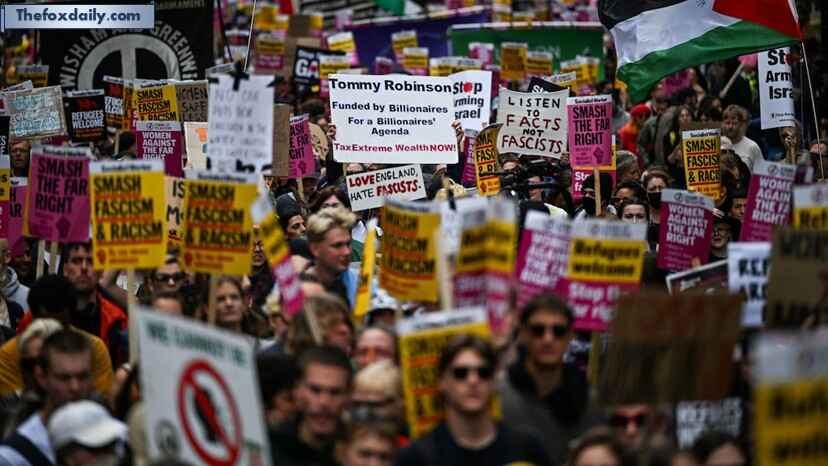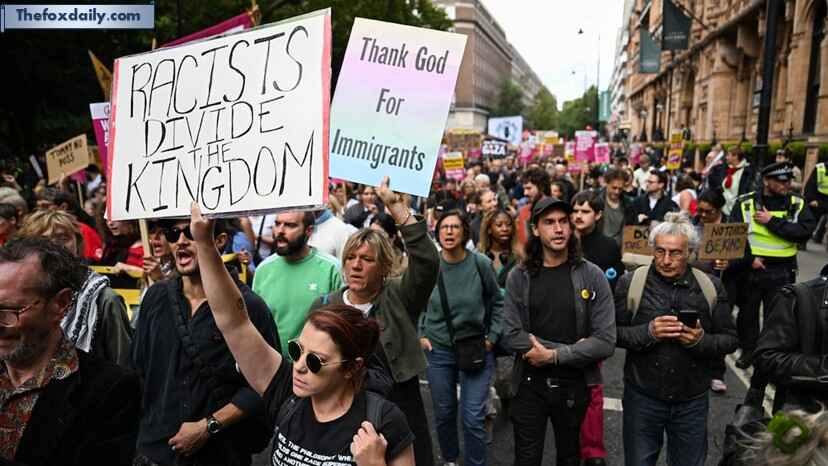
Over 100,000 protestors flooded central London on Saturday under the banner of anti-immigration activist Tommy Robinson, making it one of the biggest right-wing rallies in recent British history. London’s Metropolitan Police said the “Unite the Kingdom” march drew around 110,000 people, far exceeding expectations and overwhelming the approved route through Whitehall.
Counter-Protest and Police Response
Approximately 5,000 people joined the nearby “Stand Up to Racism” counter-protest, which was kept apart from Robinson’s supporters by heavy police cordons. At several points, officers had to intervene as “Unite the Kingdom” marchers attempted to break through police lines or veer toward opposing groups. Police reported “unacceptable violence,” including officers being kicked, punched, and pelted with bottles, flares, and other projectiles.
More than 1,600 officers, including 500 drafted in from outside London, were deployed across the city to manage the demonstrations alongside high-profile football matches and concerts. By evening, police confirmed nine arrests, warning that “many more” were likely to follow.
Symbols, Flags, and Slogans
The rally highlighted divisions within Britain’s political climate. Protesters carried the Union Jack and the red-and-white St George’s Cross, while some also waved American and Israeli flags and donned MAGA hats linked to U.S. President Donald Trump. Placards bearing slogans such as “send them home” and chants critical of Prime Minister Keir Starmer echoed throughout the crowd. Families with children were also spotted among attendees.
Tommy Robinson’s Message
Stephen Yaxley-Lennon, better known as Tommy Robinson, described the march as a “tidal wave of patriotism” and “the spark of a cultural revolution in Great Britain.” Addressing his supporters, he framed the event as a fight for free speech and national identity.
In a dramatic moment, U.S. billionaire Elon Musk appeared via video link to endorse Robinson and call for political change in Britain, saying the public was “scared to exercise free speech.” Robinson, who has multiple criminal convictions, identifies as a journalist exposing government misconduct. Despite his popularity among some, mainstream political parties — including Reform UK, currently polling strongly — continue to distance themselves from him.
Supporters and Opponents Speak Out
“We want our country back, we want our free speech back on track,” said Sandra Mitchell, a rally supporter. “They need to stop illegal migration into this country. We believe in Tommy.”
At the counter-protest, teacher Ben Hetchin voiced the opposite view: “The idea of hate is dividing us, and I think the more that we welcome people, the stronger we are as a country.”
Escalating Tensions Over Immigration
The demonstration capped a summer marked by protests outside hotels housing migrants, reflecting growing anger over Britain’s immigration policies. More than 28,000 migrants have crossed the English Channel in small boats this year, setting a record for asylum claims and fueling a political debate that has eclipsed concerns about the faltering economy.
Across the country, the red and white St. George’s Cross has appeared on roads, homes, and public spaces. While supporters describe it as a spontaneous display of national pride, anti-racism groups argue it signals rising hostility toward foreigners.

Police Urge Calm Amid Rising Divisions
Commander Clair Haynes, overseeing the operation, pledged to police “without fear or favour,” but acknowledged reports of “anti-Muslim rhetoric and offensive chanting by a minority.” She urged Londoners not to retreat indoors out of fear, warning that tensions must not silence diverse communities.
The march follows a string of heated demonstrations, including nearly 900 arrests during protests linked to Palestine Action just a week earlier. Together, they underscore Britain’s deepening divides over immigration, identity, and freedom of expression.
A Nation at a Crossroads
The ‘Unite the Kingdom’ march was more than a protest — it was a statement of anger, identity, and shifting political currents in the UK. As immigration dominates national discourse, and as figures like Robinson continue to mobilize mass support, Britain faces a critical question: Can it reconcile national pride with inclusivity, or will divisions deepen further?
For breaking news and live news updates, like us on Facebook or follow us on Twitter and Instagram. Read more on Latest World on thefoxdaily.com.






COMMENTS 0